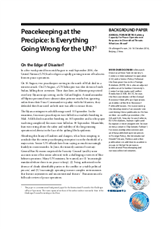BACKGROUND PAPER Peacekeeping at the Precipice: Is Everything Going Wrong for the UN?

In a five-week period from mid-August to mid-September 2014, the United Nations (UN) had to digest a rapidly growing torrent of bad news from its peace operations, there among killings in Mali, South Sudan and hostage-taking. Meanwhile, fears were rising about the safety and viability of the long-running operation in Liberia in the face of the spiking Ebola epidemic. In June, Secretary-General Ban Ki-moon announced a full-scale review of peace operations and surprised the Security Council with a challenging overview of blue helmet operations.
This paper will not focus on the Liberian case, despite Ebola’s potential to wreak havoc in the country, its neighborhood and, in a worst case scenario, the wider world. These are profoundly troubling prospects but as Michael R. Snyder remarks, the UN Mission in Liberia (UNMIL) was only mandated and equipped to play a ‘supporting role’ in the early phases of the crisis, while the World Health Organization (WHO) initially underestimated the scale of the threat. UNMIL may come to play a larger role in fighting Ebola, but this is hopefully not going to become a standard element of blue helmet operations.
By contrast, the challenges that the UN is experiencing in South Sudan, the DRC, Mali and the Middle East add up to a complex pattern of violence and disruption with the potential to undermine the entire peacekeeping enterprise. The prospect of deploying to the extremely volatile and poorly-understood Central African Republic (CAR) this September has also caused much concern in the UN. The second section of this paper argues that the UN has faced similar challenges before– sometimes with disastrous results. Veteran peacekeeping officials see parallels with the mid-1990s, when the organization’s cascade of failures in Somalia, Rwanda and the former Yugoslavia led the Security Council to cut back global peace operations dramatically.
The third section of the paper argues that the current challenges facing the UN need to be understood on three levels: (1) immediate threats to peacekeepers’ safety and freedom of action; (2) broader threats to the strategic credibility of entire missions; and (3) fundamental political challenges to the UN’s entire peacekeeping paradigm. The last section of the paper argues that, if UN peacekeeping is to survive in the years ahead, it must address problems at all these levels, becoming (1) more operationally resilient; (2) more strategically adaptable; and (3) more politically credible.

